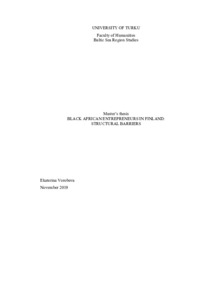Black African Entrepreneurs in Finland: Structural Barriers
Vorobeva, Ekaterina (2019-11-21)
Black African Entrepreneurs in Finland: Structural Barriers
Vorobeva, Ekaterina
(21.11.2019)
Julkaisu on tekijänoikeussäännösten alainen. Teosta voi lukea ja tulostaa henkilökohtaista käyttöä varten. Käyttö kaupallisiin tarkoituksiin on kielletty.
avoin
Julkaisun pysyvä osoite on:
https://urn.fi/URN:NBN:fi-fe2019121848864
https://urn.fi/URN:NBN:fi-fe2019121848864
Tiivistelmä
The present thesis is devoted to the phenomenon of migrant entrepreneurship in Finland. The multidisciplinary subject is formed at the intersection of economics, migration and social studies. The research aims at identifying existing structural barriers to migrants’ self-employment. The case study is based on experiences of a racial group with the lowest self-employment rate, namely, black Sub-Saharan African entrepreneurs.
The findings of the study support the disadvantage theory highlighting the unfavorable position of migrants in a market of a host state. Indeed, the content and discourse analyses of qualitative data discovered numerous structural constraints embedded in different dimensions of local opportunity structure. The research indicates that identified barriers are of relational and interactional nature.
First, the study demonstrates that black African entrepreneurs are refused in the role of equal economic actors. Wide-spread racialization that they experience affects their economic position negatively in both local and global power networks. Second, diversity has not yet become an integral part of Finnish business life. Intersectional identities with unusual combinations of race, gender, age and a business sector complicate entrepreneurial activities of immigrants. Third, opacity of local legal system demotivates and depowers migrants. Fourth, the architecture of local policies on migrants’ economic integration and protection proved to have numerous shortcomings. These findings allow to conclude that, despite the political action which is undertaken on migrant entrepreneurship promotion, Finland remains at a stage of transition towards the creation of an inclusive business environment.
The main broad direction of relevant political action can be formulated as celebration and facilitation of diversity in entrepreneurial activities, policy-making and mainstream society. More specific policy recommendations conclude the current research.
The findings of the study support the disadvantage theory highlighting the unfavorable position of migrants in a market of a host state. Indeed, the content and discourse analyses of qualitative data discovered numerous structural constraints embedded in different dimensions of local opportunity structure. The research indicates that identified barriers are of relational and interactional nature.
First, the study demonstrates that black African entrepreneurs are refused in the role of equal economic actors. Wide-spread racialization that they experience affects their economic position negatively in both local and global power networks. Second, diversity has not yet become an integral part of Finnish business life. Intersectional identities with unusual combinations of race, gender, age and a business sector complicate entrepreneurial activities of immigrants. Third, opacity of local legal system demotivates and depowers migrants. Fourth, the architecture of local policies on migrants’ economic integration and protection proved to have numerous shortcomings. These findings allow to conclude that, despite the political action which is undertaken on migrant entrepreneurship promotion, Finland remains at a stage of transition towards the creation of an inclusive business environment.
The main broad direction of relevant political action can be formulated as celebration and facilitation of diversity in entrepreneurial activities, policy-making and mainstream society. More specific policy recommendations conclude the current research.
